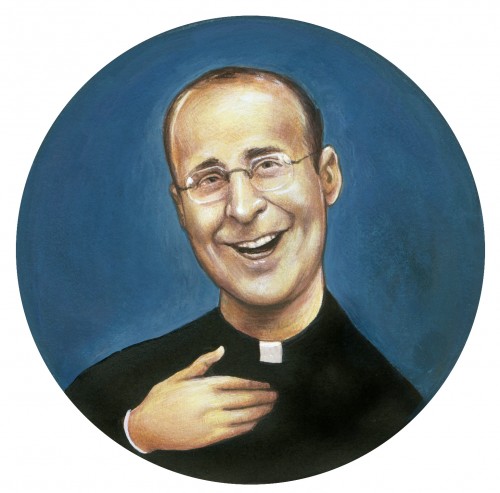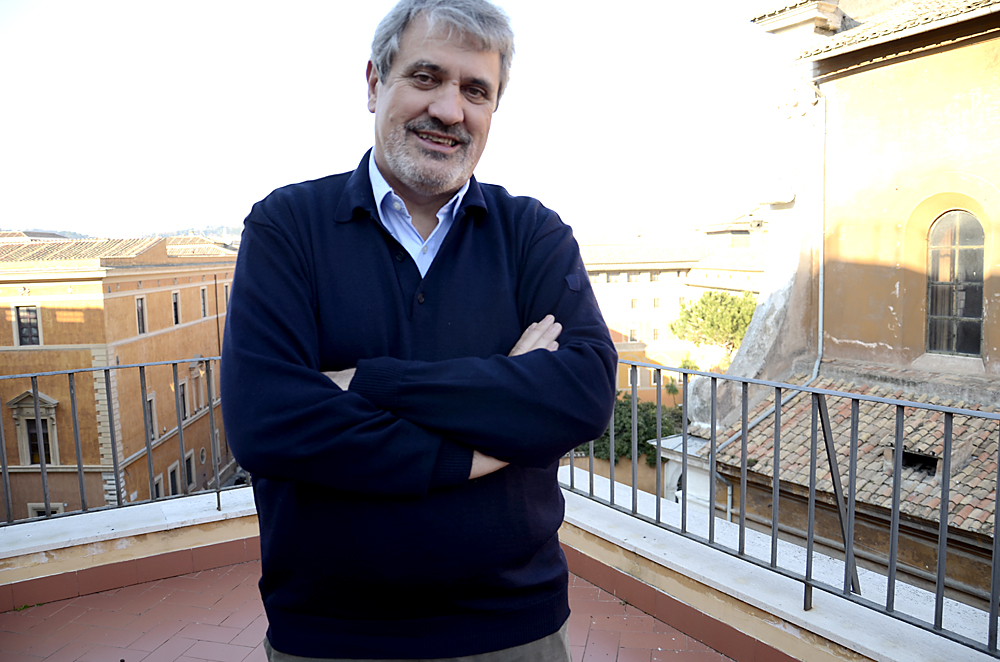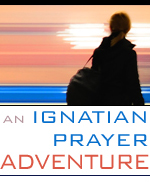God Bless our Pope Francis!
 The Chinese Province of the Society of Jesus joins people of the whole world in expressing our joy and gratitude to God for giving the Church a new Pope.
The Chinese Province of the Society of Jesus joins people of the whole world in expressing our joy and gratitude to God for giving the Church a new Pope.
As Jesuits and in union with our new Pope as companions of Jesus, we wish to remind ourselves that the Holy Father is for the universal Church, and through the Church, for the whole world.
We are also confident that the Chinese people are held dearly in the heart of our new Pope Francis. His love for the poor, his commitment to social justice, and his personal simplicity are sources of inspiration for us.
Together with all Catholics and people of goodwill, we wish to offer our prayers and unreserved support to Pope Francis. And we look forward to witnessing fruitful Petrine ministries in the coming years.
God Bless our Pope Francis!
John Lee-Hua S.J.
Provincial, Chinese Province
Give Thanks with the Examen

by Joseph Tetlow, SJ
The Ignatian Examen begins with thanks to God for all that we have and are. We might begin with the greater things like faith in Christ and life itself and then thank God for the concrete graces of the day. We can live “always and everywhere giving thanks to God” (Ephesians 5:20).
Look carefully at all we need to thank God for. Some of his gifts are given to all of us: We live in plenty. Most of us pray and worship in peace. Some of God’s gifts are deeply personal-good parents, a good marriage, faithful friends. These are all gifts from God that we may appreciate too little.
Some of our gifts are so much a part of everyday life that we do not think of them as gifts. Who thanks God for everyday things like drinkable water in every faucet? For trustworthy supermarkets? For a web of highways? We can thank God for these things too.
And then there are the greatest gifts: our “firm hope” of living with Christ forever in our own flesh. Our confidence that God cares for me, personally. Our amazing gift of the Eucharist.
We are grateful to a loving God. Grateful that our loving God remains present in the gifts he gives. Grateful that God is always acting to care and provide for us. Grateful that God the Son, Jesus Christ, came to us and remains with us, God-with-us.
As we grow in gratitude, we grow more willing to let go of our attachments to things that hold us back. This Lent is good time to reflect on these attachments and ask our Lord Jesus to free us from them.
Habemus Humor?
by James Martin, SJ

As you may have already concluded from my lack of the title “Cardinal,” I’m not eligible to vote in the upcoming conclave. Nonetheless, like every sentient Catholic, I have plenty of ideas about who the next pope should be and what he should do.
Not surprisingly, we have received many inquiries here at America from the media about those very questions. The morning that Pope Benedict XVI announced his resignation I fielded a call from one journalist who asked me what the top three qualifications might be for the next pope. “Well, first,” I said, “he has to be a holy person. Second, he needs to be able to preach the Gospel effectively. And third, he must have the ability to work within a variety of cultures.” There was an uncomfortable pause on the other end of the line. “Father, I can’t just write that he needs to be holy,” he said. “I was hoping you would talk about something like women’s ordination and birth control.”
So much for holiness.
There are many challenges facing the church that I hope the next pope will take up. (My list is too long for a column.) But as the conclave approaches, I think less about issues and more about the person. Few can predict what will occupy the working days of the next vicar of Christ, and none of the cardinal-electors has the gift of foresight. So besides considering where a candidate stands on the burning topics and sizing up his skills (administrative and otherwise), it is important to look at the spiritual qualities of the man: his prayerfulness, his freedom, his awareness of his own reliance on God. In a word, his holiness.
Let me add another quality that makes for a holy person: a sense of humor. I can think of no other job that so requires a keen sense of humor as being pope. It is an absolutely essential requirement for sustaining at least a modicum of humility. After all, it must be difficult not to get a swelled head when people kiss your ring and call you “Your Holiness” or “Holy Father.” (Frankly, one of my fantasies about what I would do as pope would be to say, “I’m not crazy about that second title. You have only one father in heaven-as my boss said.”)
Besides fostering humility, self-deprecating humor puts others at ease. One model for papal humor is Pope John XXIII, who during his pontificate demonstrated a flair for self-deprecation. Once, after his microphone failed at a public event, he said to the crowd, “Don’t worry about not hearing what I was saying. You didn’t miss anything. I didn’t say anything interesting anyway.” Archbishop Fulton Sheen, for 20 years host of a popular radio broadcast and then on television in the early 1950s and again in the 1960s, related that John XXIII once said to him: “From all eternity, God knew that I was going to be pope. He had 80 years to work on me. Why did he make me so ugly?”
Are there any papal candidates who fulfill the “sense of humor” requirement? I’m not as familiar with the papabili as John L. Allen Jr., Thomas J. Reese, S.J., or Robert Mickens, so I can’t tell you if Cardinal Gianfranco Ravasi is a hoot or Cardinal Angelo Scola knows any good knock-knock jokes. But there is at least one man who fits the bill: Cardinal Timothy J. Dolan of New York. When I was on his radio show last year, Cardinal Dolan related that when he was archbishop of Milwaukee, he met with Pope John Paul II and shared some good news with him. “Your Holiness,” said Dolan, “the Archdiocese of Milwaukee is growing!” John Paul looked him over and said, “So is the archbishop!”
If the cardinals don’t believe me, then maybe they should believe their former boss. In an interview given during his pontificate, Pope Benedict XVI shared this reflection:
I believe [God] has a great sense of humor. Sometimes he gives you something like a nudge and says, ‘Don’t take yourself so seriously!’ Humor is in fact an essential element in the mirth of creation. We can see how, in many matters in our lives, God wants to prod us into taking things a bit more lightly, to see the funny side of it, to get down off our pedestal and not forget our sense of fun.
Let’s pray for a pope who takes God and the church seriously-but not himself.
James Martin, S.J., editor at large of America, is the author of the e-book Together on Retreat: Meeting Jesus in Prayer (HarperOne).
Best Ignatian Songs: One of Us
by Jim Manney
I’m in a small group for Lent in my parish, and the other night we talked about how hard it is to see Christ in other people. A woman commented that sometimes she could see Christ more easily in people who are obviously suffering than in ordinary people she encountered all the time. People who ignored her, annoyed her. Joan Osborne sang a terrific song about that very thing-“One of Us.”
What if God was one of us?
Just a slob like one of us
Just a stranger on the bus
Tryin’ to make his way home?
God’s Gaze
by Andy Otto

One of the biggest revelations one can have in prayer is that he or she is loved, especially those who have experienced trauma or abandonment. When I was a hospital chaplain I would often recommend this prayer: imagine God gazing down on you and ask yourself how he feels.
This prayer is Ignatian in that it is inspired by the meditation on the Incarnation, which involves the Trinity looking down on the world. God’s gaze upon us is always one of love, and I had one patient who especially clung to this. He said for days he made that his prayer. Knowing God loved him made his medical situation much more bearable. So often in our attempts to find God’s presence around us we fail to realize that God is seeking us: “For the Son of Man came to seek out and to save the lost.” (Luke 19:10)
My spiritual director once recommended that for my daily Examen, instead of trying to feel God’s presence I let God feel my presence. I imagined what it might look like from God’s perspective as God brought me into God’s mind, felt my presence, and gained awareness of what I was feeling that day. This loving gaze revealed to me God’s desire for prayer with me, that my feelings mattered, and that God not only wanted to know about my day but wanted to experience it with me. That is compassionate love.
Not all of us have experienced major trauma, but every one of us has felt abandoned at one time or another, feeling needless or unimportant. Knowing that we are deeply loved by God-even sought out in compassion-is one of the greatest soul-healing realizations we can have.
Wisdom Story 51
by Paul Brian Campbell,SJ

A little wave was bobbing along in the ocean, having a grand old time. He’s enjoying the wind and the fresh air – until he notices the other waves in front of him, crashing against the shore. “My God, this is terrible,” the wave says. “Look what’s going to happen to me!”
Then along comes another wave. It sees the first wave, looking grim, and it says to him, “Why do you look so sad?” The first wave says, “You don’t understand! We’re all going to crash! All of us waves are going to be nothing! Isn’t this terrible?”
The second wave says, “No, you don’t understand. You’re not a wave, you’re part of the ocean.”
Refugees – people without past and future
 |
by Fr. Peter Balleis S.J.
JRS International Director
What defines the existence of a refugee? A journalist recently asked me this question on Swiss Radio. She could have looked up the definition in the 1951 Geneva Refugee Convention but then she was asking the question from an existential rather than a legal viewpoint. What is the meaning of being a refugee, what does it do to a person? A refugee is someone whose past has been destroyed and whose future is blocked: a person seemingly without a past or a future.
Life as a linear progression of past, present and future. We all have a past and a future, which meet in the here-and-now. Most people have a home, a place where they were born, grew up, went to school, with family and friends, in a community based on a shared culture, values and beliefs. Rooted in this past we build the present and future, with dreams, career plans, opportunities in education and our chosen profession.
No past. For a refugee, however, the past has been taken away, left behind, or destroyed: the security and protection offered by a home, family and community have been lost. Dear ones, family members have been dispersed, some or all killed. School and university studies have been abruptly interrupted. Refugees find themselves in a new country, a new culture, sometimes with another religion and value system. They can no longer refer to their past when defining their identity because it has been torn away.
For some, the experience suffered in their home country was so traumatic and deeply disappointing that they want to cut loose, never to refer to it again, much less return to it. The past is no longer a reference point for the present.
No future. But there is no future either. Many refugees feel their host country tolerates them at best but doesn’t really want them. The willingness to welcome large or even small numbers of refugees has faded. So-called xenophobia is a growing phenomenon not just in wealthier regions but also in countries in the global South, which were once receptive.
Forcibly displaced people who are granted international refugee status can end up living under the protection of the UN for more than 10, even 15 years, because their home and host countries fail to protect them. Children are born as refugees, grow up in camps and spend their entire childhood and youth there.
Many other refugees are not recognised at all. Nowadays, more than half the world’s refugees live in cities, often illegally, without documents, status or protection. They live a life in the shadows. In many countries, even recognised refugees are not allowed to work. Less than one percent have access to higher education, due to many obstacles, not least because it’s simply too expensive. No work, no higher education opportunities, no local integration, no return, no resettlement means no future for most.
Just the here-and-now. Refugees live at the crossroads between past and future. They just live in the here-and-now, often on the margins of society, at the borders of countries, in a ‘no man’s land’.
Advent and Christmas. Let’s consider the life of a refugee through the lens of Advent and Christmas. The experience of a refugee mirrors the meaning of Advent, a time in the here-and-now between the unredeemed past and expected salvation in the future.
The unredeemed past is marked by the sin of the world: greed for power, riches and glory. Across the world, people are oppressed, violated and killed for the sake of robbing their land, their resources, for the sake of the glory of a few. It is such violence and injustice that refugees have had to run away from, which destroyed their past.
Thus refugees are left with nothing but the hope and desire for peace, for a new home where they will find protection. They wait for years for this new home, which will be either back in their country, or in the host country through local integration, or in another country where they may be resettled. They wait patiently, without ever losing hope, until one day the message of peace is announced, the message delivered by the angel at Christmas: Peace on earth to all people of goodwill (cf. Lk 2:14).
The existence of refugees is an illustration of the theological meaning of advent, of a people who live in darkness and who see a great light, as the prophet Isaiah (cf. Is 9:2).
Jesuit Refugee Service nourishes the hope of Christmas. Working with refugees, JRS also experiences this dimension of Advent to some degree. There is no need to go into detail to understand what it means for JRS teams to share the tragedies unfolding right now in eastern Congo and Syria. Hundreds of thousands have fled the wanton destruction. JRS still has teams on the ground in eastern Congo and Syria, holding out for as long as possible with people who are forced to endure an unredeemed world at war, a place in the here-and-now without past or future.
This is in line with our mission that gives priority to accompanying refugees, to being with them and sharing to some degree the dangers they are exposed to.
Another priority of JRS is to serve refugees by offering psychosocial and pastoral care, and especially education, to kindle hope through learning. JRS formal and informal education programmes reach over 250,000 children, young people and adults. School is about more than increasing knowledge, it is a place where the past is healed and the future is gained.
Education in the here-and-now of a refugee’s life helps to re-connect the lost past and future. One can lose everything but not what one carries in the mind and heart, knowledge and values, the spirit of hope. Education is a source of hope and an instrument of peace.
The mission of JRS finds deep meaning in Advent, striving for the hope, joy and peace celebrated at Christmas. It is about finding a new home, the protection of a new family, community and country, just as Mary and Joseph found a humble place in Bethlehem, cared for by the poor shepherds who were the first to hear the message of the angels: Peace on earth to all people of goodwill.
A dignified missionary presence lost

by HONG KONG Sunday Examiner
A quiet, but dignified missionary presence was lost to Hong Kong on February 5 with the death of Jesuit Father Ciaran Finbarr Kane. He was 80 years old.
Born in Durbin, Ireland, in 1932, he joined the Society of Jesus in 1950, graduating from the University College Dublin, now known as the National University of Ireland, before coming to Hong Kong in 1958.
He was ordained a priest at the Jesuit house of Milltown Park, Ireland, on the feast of St. Ignatius Loyola, the founder of the Jesuits, on 31 July 1964.
A talented and adaptable man, he taught at both Wah Yan Colleges, in Kowloon and Hong Kong, but in 1971 he became the founding chaplain at the Adam Schall Residence of the United College at the Chinese University of Hong Kong, where he forged good relationships with both the administration and teaching staff until the university took over management of residence in 1994.
A tribute from the current management of the college notes, “Throughout his distinguished affiliation with United College in the past decades, Father Kane has given invaluable advice and guidance to the development of the college. He was loved and respected by the college community; his dedication will be forever cherished.”
During his time in Hong Kong, Father Kane was also on the staff of Star of the Sea parish in Chai Wan, but in 2004 he moved to the society’s retreat centre, Xavier House, in Cheung Chau, where he lived quietly as a spiritual director until 2012, touching the atmosphere within the walls and grounds with the serenity of a man of God.
His other great love was music and he became the well-known voice of RTHK4 (Radio Television Hong Kong) presenting sacred music for its programme, Gloria.
The director of the Hong Kong City Chamber Orchestra paid tribute to Father Kane’s appreciation of the religious dimension of music last year, when he took part in a presentation of Johann Sebastian Bach by cellist, Artem Konstantinov.
The musical presentation was interspersed with the words of Christ, read by Father Kane.
“It has been a pleasure to develop the idea of combining Bach’s unaccompanied cello suites with passages from the bible with both Father Ciaran Kane and Artem,” the director wrote at the time.
“It has also been a thought-provoking task, for such a combination of scripture readings and unaccompanied music has never been done before worldwide, I imagine,” she continued.
The newsletter also pays tribute to the artistic suggestions of Father Kane in creating a suitable atmosphere in the small chapel of St. Stephen’s College in Stanley, with candlelight and shadows.
His broadcasting career saw him presenting both Catholic and ecumenical programmes, including Morning Prayers and a twice-weekly Midday Prayers, together with live broadcasts of Sunday religious services on a monthly basis.
He is especially remembered for his tribute to fathers on a Fathers’ Day programme, featuring the music of Eric Clapton.
He was a member of the Religious Broadcasting and Television Advisory Committee at RTHK and made the move to free-to-air television, taking part in discussions on the infant TVB on matters as diverse as Christmas and Easter, coverage of the visit of Pope Paul VI to Hong Kong in December 1970 and the opening of the Holy Door in St. Peter’s Basilica in Rome to usher in the Jubilee Year in 2000.
His sister, Eileen Kane, said on February 13 at a vigil Mass in St. Margaret’s, Happy Valley, the evening before his funeral, that her brother had no other dream than to join the Jesuits.
She related how she accompanied him to a talk given by a Jesuit priest when he was a young man, saying that from that day on, he was quite convinced he had found his true vocation and road in life.
Father Kane died peacefully after being hospitalised for three weeks in Eastern Hospital.
He was buried from St. Margaret’s on February 14 in St. Michael’s Happy Valley Cemetery.
May he rest in peace.
Praying in Strange Places

by Michelle Francl-Donnay
I have been traveling this week, eating and sleeping—and praying—in strange places. I spent the last few days at an exuberant and delightfully chaotic science conference. People struggled to capture what was happening, scribbling notes like mad in pocket notebooks, snapping photos, and recording videos. The strands of conversations wove back and forth, but there was no time to stand back to see the emerging pattern.
On the last day I took a shortcut through an empty auditorium. I found myself wanting to sit down, take out my notes, project the conference Twitter stream up on the giant screen, and in the silence try to make some sense of it all.
Tonight, as I pulled my prayer journal from my travel bag, and settled once again into the quiet stillness of my attic study to pray, I felt that same desire. It’s just over a week since I embarked on this adventure with God. Can I step back and see where I’ve been, look for patterns that might be emerging?
I sipped my tea and skimmed through the notes I had jotted after each time of prayer, asking God to look over my shoulder with me, and help me pull out the strands that we felt were important. I made a few notes: the couple of words that came up again and again, the point of reflection that I struggled with all week.
Until this moment, I hadn’t realized how disconcerting I found all the shifting around I was doing. I prayed in airport waiting areas (twice!), at midnight on the 14th floor of a hotel—in the middle of a tornado watch, glass windows shivering in the wind—and at home, awash in an afternoon’s sunlight. I wanted these weeks of prayer to have a comfortable rhythm to them, a steady discipline of time and place, and yet I couldn’t seem to find it.
God was not dismayed, gently pointing out that the shifts in retreat were making me more aware of who he was for me. My rock, my stronghold, that voice that I hasten to hear. Not just in my prayer space, not just at nine in the evening, but, as Psalm 121 sings so clearly, at every moment: “The LORD will watch over your coming and going both now and forevermore.”
Notice, God says, how you are learning to set down roots of prayer no matter where—or when—you find yourself. Notice that I am here. Always.
Michelle Francl-Donnay is the mother of two teenage boys, a professor of chemistry, and a regular contributor to Philadelphia Archdiocese’s CatholicPhilly.com , where she writes about the joys and struggles of trying to live a contemplative life in the midst of everyday chaos. Michelle gives the occasional retreat and blogs about life, laundry, prayer, and God at Quantum Theology.
Wisdom Story 50
by Anthony de Mello, S.J.

Two jewel merchants arrived at an oasis in the desert at about the same time one night. Each was quite conscious of the other’s presence, and while unloading his camel, one of them could not resist the temptation to let a large pearl fall to the ground as if by accident. It rolled in the direction of the other who, with affected graciousness, picked it up and returned it to its owner saying, “That is a fine pearl you have there, sir. As large and lustrous as they come.”
“How gracious of you to say so,” said the other. As a matter of fact, that is one of the smaller gems in my collection.”
A Bedouin who was sitting by the fire and had observed this drama, rose and invited the two of them to eat with him. When they began their meal, this is the story he told them:
“I, too, my friends, was once upon a time, a jeweler like you. One day I was overtaken by a great storm in the desert. It buffeted me and my caravan this way and that till I was separated from my entourage and lost my way completely.
Days passed and I was panic-stricken to realize that I was really wandering bout in circles with no sense of where I was or which direction to walk in. Then, almost dead with starvation, I unloaded every bag on my camel’s back, anxiously searching through them for the hundredth time.
Imagine my excitement when I came upon a pouch that had escaped my notice before. With trembling fingers I ripped it open hoping to find something to eat. Imagine my disillusionment when I found that all it contained was pearls!”






